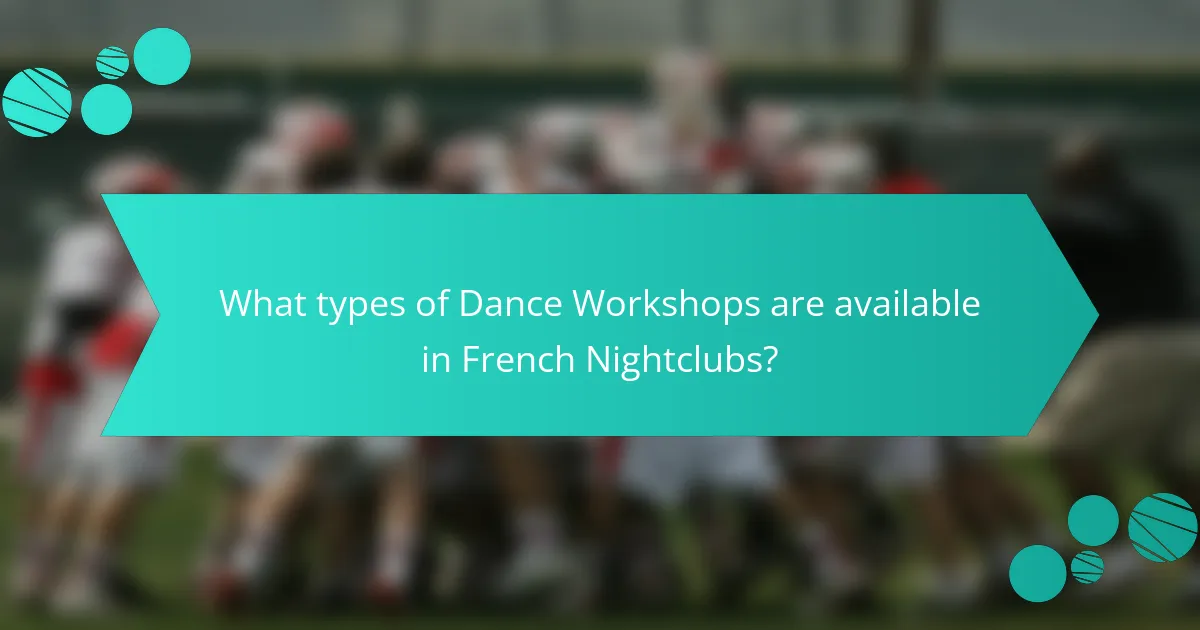Dance workshops in French nightclubs are organized events designed for participants to learn various dance styles, including salsa, hip-hop, tango, and contemporary. These workshops cater to all skill levels, featuring professional instructors who guide attendees through essential techniques and choreography. Participants engage in both group and individual practice, enhancing their skills while fostering community engagement. The vibrant nightclub atmosphere contributes to an immersive learning experience, allowing dancers to socialize and network. This article explores the types of workshops available, the benefits of participation, and strategies for maximizing learning opportunities within these dynamic environments.

What are Dance Workshops in French Nightclubs?
Dance workshops in French nightclubs are organized events where participants learn various dance styles. These workshops cater to different skill levels, from beginners to advanced dancers. They typically feature professional instructors who guide attendees through techniques and choreography. Workshops often focus on popular dance genres like salsa, hip-hop, or contemporary. Participants engage in both group and individual practice during these sessions. Many nightclubs in France host these workshops to promote social dancing and community engagement. The vibrant atmosphere enhances the learning experience, making it enjoyable and immersive.
How do Dance Workshops in French Nightclubs differ from other types of workshops?
Dance workshops in French nightclubs differ from other types of workshops primarily in their immersive environment and cultural context. These workshops take place in vibrant nightlife settings, enhancing the learning experience through music and atmosphere. Participants engage with contemporary dance styles that are often influenced by local trends and genres. This contrasts with traditional workshops, which may focus on classical or structured dance forms in more formal settings. Additionally, French nightclub workshops often incorporate social dancing elements, encouraging interaction among participants. This fosters a sense of community and spontaneity not typically found in conventional workshops. The integration of live DJs and performers further enriches the experience, creating a dynamic learning atmosphere.
What specific dance styles are taught in these workshops?
Dance workshops in French nightclubs typically teach styles such as salsa, bachata, and tango. These styles are popular due to their energetic and social nature. Salsa is characterized by its fast-paced rhythm and intricate footwork. Bachata, originating from the Dominican Republic, focuses on romantic movements and close partner connection. Tango, known for its dramatic flair, emphasizes connection and improvisation between partners. These workshops often include beginner to advanced levels, catering to various skill sets. Participants benefit from professional instructors who provide guidance and support.
Who are the instructors leading these workshops?
The instructors leading these workshops are experienced dance professionals. They typically have backgrounds in various dance styles. Many have formal training in dance education. Some instructors may also be professional performers. Their expertise often includes styles such as salsa, tango, or hip-hop. Many instructors have taught in multiple venues. They may also have experience in competitive dance. This diverse background enhances the quality of the workshops.
What is the typical structure of a Dance Workshop in a French Nightclub?
A typical structure of a dance workshop in a French nightclub includes several key components. It usually begins with an introductory session. This session often includes a welcome message and an overview of the workshop’s objectives. Following the introduction, participants engage in a warm-up routine. The warm-up prepares dancers physically and mentally for the session.
Next, the instructor demonstrates dance techniques or routines. This demonstration is crucial for participants to understand the movements. Afterward, participants practice the techniques in small groups. This group practice allows for peer feedback and interaction.
The workshop often includes a segment for freestyle dancing. This segment encourages creativity and personal expression among participants. Finally, the session concludes with a cool-down period. The cool-down allows dancers to relax and reflect on their experience.
Overall, this structure promotes skill development and social interaction. Dance workshops in French nightclubs are designed to be engaging and educational.
What duration do these workshops usually last?
Dance workshops in French nightclubs usually last between one to three hours. This duration allows participants to engage in a focused learning experience. Workshops shorter than one hour may not cover essential techniques. Workshops longer than three hours can lead to fatigue and reduced participation. Most workshops balance content delivery and participant engagement within this timeframe.
What is the format of a typical session?
A typical session in dance workshops at French nightclubs usually consists of structured segments. These segments include warm-up exercises, technique training, choreography learning, and cool-down activities. Each session typically lasts between one to two hours. Participants engage in a warm-up to prepare their bodies. This is followed by focused instruction on specific dance techniques. Choreography is then introduced, allowing dancers to practice routines. Finally, a cool-down phase helps participants relax and recover. This format promotes skill development and enhances the overall dance experience.
What are the key benefits of participating in Dance Workshops in French Nightclubs?
Participating in dance workshops in French nightclubs offers several key benefits. First, these workshops enhance dance skills through professional instruction. Participants learn various dance styles, improving their versatility. Additionally, workshops foster social connections among attendees. This networking can lead to friendships and collaboration opportunities.
Moreover, engaging in these workshops boosts confidence in performance settings. Improved self-esteem often results from mastering new techniques. The vibrant atmosphere of nightclubs also enhances the overall experience. Participants enjoy a unique blend of learning and entertainment.
Furthermore, workshops often feature experienced instructors from diverse backgrounds. This exposure enriches the learning experience with varied perspectives. Overall, dance workshops in French nightclubs provide a comprehensive platform for skill development, social engagement, and personal growth.
How do these workshops enhance dancing skills?
Dance workshops enhance dancing skills by providing structured learning environments. Participants receive expert instruction tailored to various styles. This guidance helps improve technique and body awareness. Workshops often include practice sessions, allowing for real-time feedback. Engaging with peers fosters a sense of community and motivation. Regular attendance can lead to increased confidence in performance. Studies show that focused practice significantly boosts skill acquisition. Overall, workshops create opportunities for dancers to refine their abilities and explore new styles.
What social benefits can participants gain from these workshops?
Participants can gain enhanced social connections from dance workshops in French nightclubs. These workshops foster a sense of community among attendees. Participants often form friendships through shared experiences and collaborative learning. Engaging in dance requires teamwork and communication, which builds social skills. Additionally, workshops promote cultural exchange among diverse groups. This interaction enhances participants’ understanding of different backgrounds. Studies show that social interactions in group activities improve overall well-being. Thus, dance workshops not only teach skills but also enrich social lives.

What types of Dance Workshops are available in French Nightclubs?
French nightclubs offer various types of dance workshops. These workshops include styles such as salsa, hip-hop, and tango. Each workshop caters to different skill levels, from beginners to advanced dancers. Salsa workshops focus on rhythm and partner work. Hip-hop workshops emphasize street dance techniques and freestyle. Tango workshops teach connection and improvisation between partners. Additionally, some nightclubs offer workshops in contemporary dance and swing. These workshops often feature experienced instructors from the dance community. Participants can improve their skills and socialize with fellow dancers during these sessions.
What are the most popular dance styles featured in these workshops?
The most popular dance styles featured in these workshops include salsa, hip-hop, and contemporary dance. Salsa is known for its energetic movements and partner work. Hip-hop emphasizes street dance styles and improvisation. Contemporary dance combines elements of various dance forms and focuses on expression. These styles attract diverse participants seeking to enhance their skills. Workshops often highlight these genres due to their popularity in social settings. The vibrant atmosphere of French nightclubs further promotes these dance styles. Participants appreciate the opportunity to learn from experienced instructors in a lively environment.
How do contemporary dance workshops differ from traditional styles?
Contemporary dance workshops emphasize creativity and self-expression, unlike traditional styles that focus on structured techniques. Contemporary workshops often encourage improvisation and personal interpretation. This allows dancers to explore their individuality. Traditional styles, such as ballet, prioritize form and adherence to established movements. Contemporary dance incorporates diverse influences, blending genres and styles. This fusion creates a more dynamic and fluid approach to movement. Workshops in contemporary dance also tend to be more inclusive, welcoming dancers of all skill levels. In contrast, traditional workshops may have stricter prerequisites for participation. Overall, contemporary dance workshops foster a more experimental and open environment compared to traditional styles.
What unique experiences do themed workshops offer?
Themed workshops offer immersive experiences that enhance learning and engagement. Participants engage in activities tailored to specific themes, such as cultural dance styles or musical genres. This approach fosters creativity and encourages self-expression. Themed workshops often include expert instructors, providing insights and techniques relevant to the theme. Additionally, they create a sense of community among participants with shared interests. Unique environments, such as French nightclubs, further enrich the experience, blending social interaction with skill development. The combination of focused content and dynamic settings makes these workshops memorable and impactful for attendees.
What are the variations in workshop formats?
Variations in workshop formats include hands-on, lecture-based, and hybrid models. Hands-on workshops focus on practical skills and active participation. Participants engage directly with the material or techniques being taught. Lecture-based workshops prioritize information delivery through presentations. These formats often include Q&A sessions for participant interaction. Hybrid workshops combine elements of both hands-on and lecture formats. This approach provides a balanced experience of theory and practice. Each format caters to different learning preferences and objectives. Evidence shows that active participation enhances retention of skills in dance workshops.
What are the differences between group and private workshops?
Group workshops involve multiple participants learning together, fostering collaboration and social interaction. In contrast, private workshops focus on individual or small group instruction, allowing for personalized attention. Group workshops typically have a set curriculum designed for a larger audience. Private workshops can be tailored to specific needs or skill levels, providing flexibility in content.
Group workshops may encourage a sense of community and shared experience among attendees. Private workshops often lead to faster skill acquisition due to focused instruction. Group settings can create a lively atmosphere, while private sessions may offer a quieter environment conducive to learning. Overall, the choice between group and private workshops depends on individual learning preferences and goals.
How do beginner workshops compare to advanced sessions?
Beginner workshops focus on foundational skills, while advanced sessions emphasize complex techniques. Beginner workshops typically cover basic movements and rhythm. They aim to build confidence and introduce participants to dance styles. Advanced sessions challenge experienced dancers with intricate choreography and advanced concepts. Participants in advanced sessions often have prior experience and seek to refine their skills. Research indicates that skill progression in dance is most effective when foundational techniques are mastered first. This structured approach enhances overall performance in advanced levels.

How can participants maximize their learning opportunities in Dance Workshops?
Participants can maximize their learning opportunities in dance workshops by actively engaging in all activities. They should practice regularly to reinforce new skills learned during sessions. Asking questions clarifies concepts and techniques that may be confusing. Observing instructors and peers provides additional insights into different styles and methods. Networking with fellow participants fosters collaboration and shared learning experiences. Setting personal goals helps maintain focus and motivation throughout the workshop. Recording sessions allows for review and reflection on progress. Lastly, maintaining a positive attitude enhances the overall learning environment and personal growth.
What tips can help beginners get the most out of their experience?
Beginners can maximize their experience in dance workshops by actively participating and asking questions. Engaging with instructors enhances understanding and retention of techniques. Practicing consistently outside of workshops reinforces skills learned. Connecting with fellow participants fosters a supportive learning environment. Setting specific goals for each session helps track progress. Being open to feedback allows for improvement and growth. Dressing comfortably enables freedom of movement, enhancing the overall experience. Lastly, maintaining a positive attitude encourages enjoyment and exploration in dance.
How important is practice outside of workshops?
Practice outside of workshops is crucial for skill development. It reinforces techniques learned during workshops. Regular practice enhances muscle memory and builds confidence. Studies show that consistent practice leads to improved performance. For instance, dancers who practice regularly outside of structured classes exhibit greater proficiency. This additional practice allows for experimentation and personal style development. Engaging in practice sessions increases overall dance enjoyment and satisfaction. Therefore, practice outside of workshops is essential for long-term success in dance.
What role does feedback from instructors play in improvement?
Feedback from instructors plays a crucial role in improvement. It provides students with specific insights into their performance. This guidance helps identify strengths and weaknesses. Instructors can suggest targeted areas for practice. Research indicates that constructive feedback enhances skill acquisition. A study by Hattie and Timperley (2007) found that feedback significantly boosts learning outcomes. Effective feedback can increase motivation and engagement among students. It fosters a growth mindset, encouraging continuous development. Overall, instructor feedback is essential for maximizing improvement in dance workshops.
What are common challenges faced by participants in these workshops?
Common challenges faced by participants in dance workshops include difficulty in mastering new techniques. Participants often struggle with coordination and rhythm. Some may feel intimidated by more experienced dancers. Time constraints can limit practice outside of workshops. Additionally, language barriers may hinder communication with instructors. Participants may also experience fatigue during intensive sessions. Lastly, varying skill levels among participants can create a challenging learning environment. These challenges can impact overall enjoyment and learning outcomes in the workshops.
How can participants overcome performance anxiety?
Participants can overcome performance anxiety through several effective strategies. Practicing relaxation techniques, such as deep breathing and visualization, can significantly reduce stress levels. Engaging in regular rehearsals builds familiarity with the performance, leading to increased confidence. Setting realistic goals helps participants focus on personal progress rather than external judgment. Seeking support from peers fosters a sense of community and shared experience. Positive self-talk can reframe negative thoughts, enhancing overall mindset. Research indicates that these methods improve performance outcomes and reduce anxiety levels in participants.
What strategies help in mastering complex dance moves?
Practice regularly to master complex dance moves. Consistent repetition builds muscle memory and improves technique. Break down the moves into smaller sections. Focus on mastering each section before combining them. Use mirrors to observe and correct your form. This visual feedback enhances precision in execution. Record your practice sessions to analyze your progress. Watching yourself can reveal areas for improvement. Seek feedback from instructors or peers to gain new perspectives. Their insights can help refine your technique. Attend workshops or classes to learn from experienced dancers. Structured learning environments provide valuable guidance and support.
Dance workshops in French nightclubs are organized events where participants learn various dance styles, such as salsa, hip-hop, and tango, under the guidance of professional instructors. These workshops cater to different skill levels, promoting social interaction and community engagement in a vibrant nightlife setting. The article explores the structure, duration, and benefits of these workshops, highlighting how they enhance dancing skills and foster social connections among attendees. Additionally, it addresses challenges participants may face and offers strategies for maximizing learning opportunities.